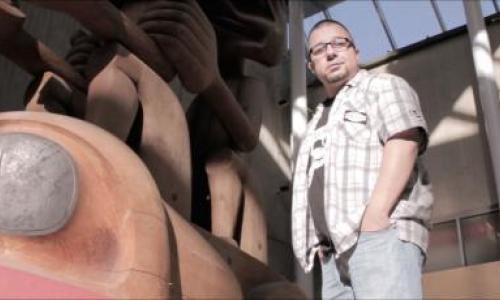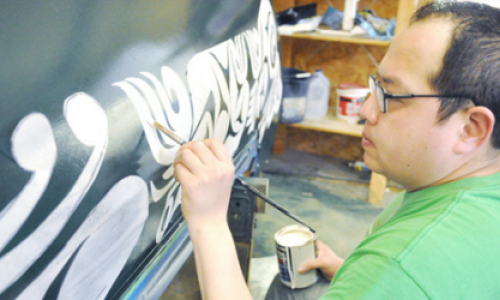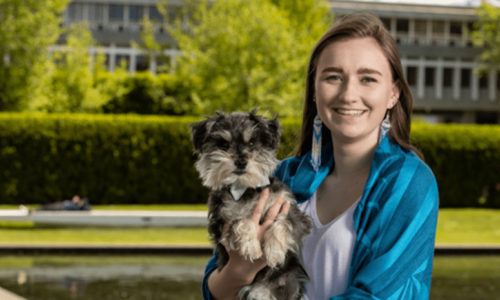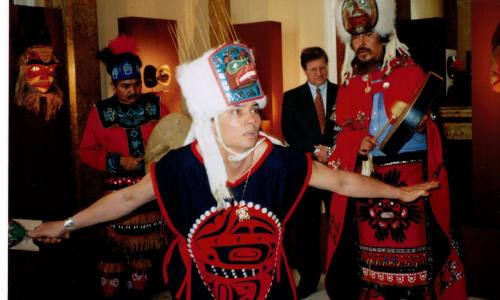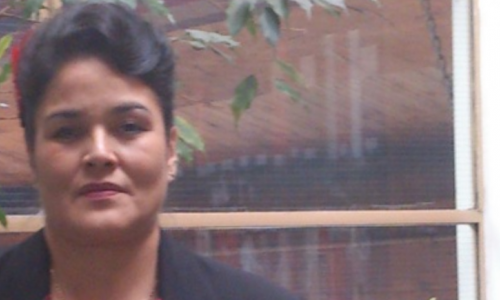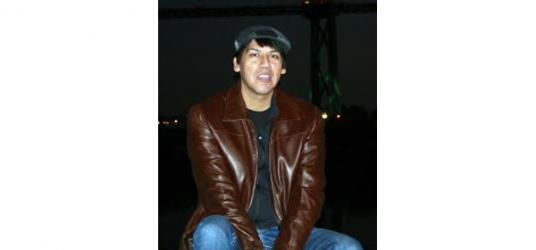
Aboriginal Social History
Gerald was born in Lytton, British Columbia. He is a Status Aboriginal man and is a member of the Lytton First Nation, which about 3 hours from Vancouver, BC. His traditional territory is referred to as the Nlakapamux Nation, which is geographically located between Hope and Cache Creek, BC. The Nlakapamux people believe that they have been living within their traditional territory since time immemorial. His reserve has been referred to as the "Indian Village of Kumsheen," which means where the [Thompson] and [Fraser] rivers cross or meet. Both of Gerald's parents, as well as, his aunts and uncles went to an Indian Residential School.
Early Education History
Growing up, my mother would always impress upon me, that I needed to do well in school and pursue a post secondary education. I did not do well in high school. As I reflect back, everyone, including my own people, told me that I would not amount to anything, which I think is one of the major reason why I did not do well in school. One other reason why I did not put any effort into my studies was I thought I knew everything, and nobody, not even my mother motivating me, would make me work hard to get good grades in school. In my last two years of high school, the school I went to did something that flabbergasted me; they hired an Aboriginal teacher/school counsellor. At that time, there were not many First Nations teachers working within the public school system. In my final year of high school, the Aboriginal school counsellor met with all the Aboriginal students individually and asked us, "Have you thought about going to college or university? Have you thought about getting a degree?" When I met the school counsellor I replied, "No. Not really. I'm probably just going to stay in Lytton and try to find a job at the Band Office." The counsellor then asked me, "If there is one career or something you see yourself doing, what would that job be?" I said, "Well I always thought about getting into teaching because my mom is an elementary school teacher." The counsellor then looked at my grades and said, "You know, your grades for most of your courses you have completed are not very high. I don't think you have the grades to get into university, but you should apply to one of the colleges to see if you get in."
Before graduating from high school, I applied to a college in the Vancouver area and to my surprise, I was granted admission. I did not do very well in my first year of college. I managed to pass all my courses, but my grades were not very good. Looking back, one of the main reason why I think I did not do well was I remember being the only Aboriginal student in my class, plus the fact that I was missing home, and I was in the city with no close family members to support me. I also noticed that there was also not a lot of Aboriginal Support Staff, including Elders at the college I attended and there was no First Nation student common room for Aboriginal students to meet. The following semester I did not go back to college.
Work History
Two weeks before Labour Day long weekend, I finally found the courage to tell my mom and dad that I was not going back to school. I told them it was hard to be away from them and that I missed the REZ life and that I do not like it that there was no family support nearby. Most importantly, I told them I did not like it that I was the only First Nations student in all of my courses. My parents were upset with me, but they understood my concerns. My father told me, "If you're not going to go to school you have to find some type of work to keep busy! You're not going to just sit at home and watch TV all day!" I managed to find work on the REZ, but to my surprise, about a year later, I found myself moving back to the city to attend the Native Education Center (NEC). The NEC was offering a job-training program for Aboriginal students interested in getting into the banking industry. I applied to the program and was successful at getting one of the seats in the program. I passed the program and was offered a full time position at a financial institution in Vancouver. I liked working in the bank. It gave me independence, and allowed me to support myself, but most important, I found a way to stay in the city. During my time at the bank, I noticed every summer the bank would hire several students who were working their way through university. I always took time to speak with these students, and I would always talk to them about their education journey and asked them what they were studying. These students would tell me what they were majoring in and what college or university they were attending. I shared that I completed one year of college and that I always thought about going back to school. Every student I spoke to encouraged me to go back to school, but I had become so comfortable with working. I did not want to be a starving student! I cannot remember what motivated me to leave my job, but I did and applied to Capilano College, which is now referred to as Capilano University.
Return to Education
Since I was out of school for so long, I had to humble myself and take a lot of upgrading courses at Capilano University. I enrolled in the Aboriginal Adult Basic Education (ABE) program, and after completing the required ABE courses, I transitioned into the College level courses. I liked going to Capilano University. There were several Aboriginal Students who attended this school, and most importantly, they had a First Nation Advisor, who was there to support all Aboriginal, Indigenous, Métis, Inuit and Two-Spirited students. During my time at Capilano, something totally unexpected happened to me. Sometime in my third semester, my mother, who was an Indian Residential School survivor, started to get very ill, and ended up in the hospital. I immediately informed all my teachers about my mother's condition, and that I would be going back to the REZ to be with her and my family. When I got back to the reserve, my mother's health had deteriorated so bad that she was hospitalized. I was so scared and during one visit at the hospital, I told her I was going to quit school to help my dad take care of her. As sick as my mother was she told me, "Gerald. Don't quit school. Promise me you will finish your studies and go to university. You need to finish your studies so you can help our people!" I stayed at home for about a week, and once my mother's health improved slightly; I traveled back to the city to resume my studies. Sadly, about a week later my Mother passed away to the Spirit World. When mom passed away, I was so emotionally distraught that I almost quit Capilano University, but I promised my mom that I would finish my studies. It took a while for me to get over my mom's death, but I knew she would be watching over me. In 2001, I finally completed an Associate of Arts Degree Diploma at Capilano University, and decided to apply to a university. Looking back at my grades, I managed to get a lot of C+ and B-, grades, but I could never get that "A" grade while at Capilano. I think one of the reasons why I did not get the "A" grade was I was always the student in the back of the classroom praying, "Please God, don't let the teacher ask me any questions." When the teachers did call on me to participate, I had a hard time articulating an answer to many discussion questions. Part of the reason I was afraid to speak up in class was I would always remember how people would always tell me that I would not amount to anything and that I was stupid! I was afraid to use my voice! This is funny because during my final year of college I decided I wanted to be an elementary school teacher.
In 2003, I applied to Simon Fraser University. To my surprise, I was granted admission. By this time, I knew I wanted to get into teaching. I also knew that I had to start getting better grades in order to get into the Professional Development Program (PDP), which is the year-long teacher-training program at SFU. I was starting to come out of my shell more and part of the reason for this was I was starting meeting other Aboriginal Students on campus at SFU. I also joined the First Nations Students' Association (FNSA), and spent a lot of time with the Grass Roots members of the FNSA, and attending FNSA collective meetings, which were at the FNSA Common Room. While at SFU, I decided to major in Anthropology/Sociology. Within this faculty, I found the Professors and Lecturers were very supportive of me researching topics that I found fascinating. In Anthropology, I did a lot of research on my own Aboriginal people, as well as the Two-Spirited Community of Vancouver. I finally started to improve in my grades and part of the reason for this was I was researching topics I thought were important and not being talked about. In 2005, I applied to the PDP program and completed the Indigenous Peoples Teacher Education Module (IPTEM). In 2006, I finally completed my degree and convocated. This was the happiest day of my life! Not long after, the Vancouver School Board (VSB) hired me. I was a Teacher on Call (TOC) and worked at several schools within the Vancouver school district. I loved teaching, but looking back, the VSB never gave me any teaching assignments where there were high populations of Aboriginal students. One of the main reasons I went into teaching was I wanted to support Aboriginal students, and show them they can succeed at University.
Professional History
Sometime in 2007, I went for coffee with a close friend of mine who was working for the Correctional Service of Canada (CSC) and told him how I was feeling like I was not helping my Aboriginal community. My friend suggested I apply to the CSC as an Aboriginal Liaison Officer (ALO). I emphatically told my friend, "CSC is not going to hire me! I have no idea what is involved in working inside a prison!" I did not tell my friend this, but I also felt that since I was from such a diverse background, the old boys' network of the CSC would not let me in, but to my surprise, they did. After a lengthy hiring process, the CSC offered me an ALO position. I became an indeterminate employee, and in 2008, I transferred to Correctional Programming, where I took the position of Aboriginal Correctional Programs Officer (ACPO). As an ACPO, I work with the Elders and other Case Management Team members, such as the Institution Parole Officers, and ALO’s to help rehabilitate Aboriginal offenders. During programs, I teach culturally appropriate healing and treatment programs to Aboriginal and Métis offenders. The Elders and I work hard to motivate, and guide the Aboriginal inmates to move forward on their Healing Journey, which is also referred to as their path to rehabilitation. In programs, I teach the Aboriginal inmates skills and competencies, such as problem solving, and challenging distorted thinking, which are necessary for a safe reintegration back into the community. At work I give the Aboriginal Inmates a lot of advice, and assess their attitude and progress they make towards addressing their risk factors. As an ACPO, I utilize a lot of my PDP training. For example, as a Programs Officer I am responsible for class preparation, I mark offender's work, and complete a final program report on an Aboriginal offender's progress and performance. These reports talk about the inmates’ program gains, and skill deficits, and allow decision makers such as the Warden, the Institution Parole Officer, and the Parole Board of Canada, to decide if the Aboriginal offender should be granted conditional release, or transfer to a minimum security institution.
It is 2013, and I am still working for the CSC as an ACPO. Many of my friends still have a hard time believing that I work in a federal prison with male offenders. My friends ask me, "Why do you work in a prison?" I tell them, "being an ACPO is challenging and sometimes working in a prison can be a scary place, especially if there is a riot, or a guy on my caseload is denied parole and he is angry about it and vents to me about it, or worse if one of my colleagues is assaulted. These are some of the realities when working inside a prison, but I now feel like I have a career working within Aboriginal corrections, and I now feel like I am actually helping my people."
Current Education History
In 2011, I decided I wanted to get back into university and study Criminology. I reapplied to SFU and once accepted I decided to take some Criminology courses. I enrolled in the Post Baccalaureate Diploma program within the School of Criminology. I am interested in researching the therapeutic benefits of Aboriginal Ceremony and its effects on violent behaviors among Aboriginal Inmates. One of the main motivations for this research topic is there is very limited information on this topic, and virtually no information on a CSC staff member working in the field of Aboriginal Corrections. Since I’ve returned to SFU, I’ve been a guest speaker for Criminology 131, where I have shared information about Corrections and Aboriginal Programs. When I’m invited to speak with students about Corrections I always try to invite an Aboriginal Elder, or another CSC colleague of mine, to shares what their role is with the CSC Aboriginal Continuum of Care. My long-term education goal is to apply to the M.A. program within the School of Criminology. My research question is, “Do Aboriginal Inmates who practice and participate in Aboriginal Ceremony have lower incidents of violence? An Emic/Insiders perspective of an ACPO.”
To close, one of the main reasons why I like being a guest speaker and sharing with students about Corrections is I notice a lot of students have distorted notions about Corrections and Aboriginal treatment programs. My hope is that after the Elder and I, or my colleagues speak about Corrections, students at SFU will come to new conclusions about the CSC. I enjoy working for the CSC. As already stated, what stands out for me is I now feel like I have a career and that I am helping my Aboriginal community heal from the Intergenerational Impacts that they have experienced.








